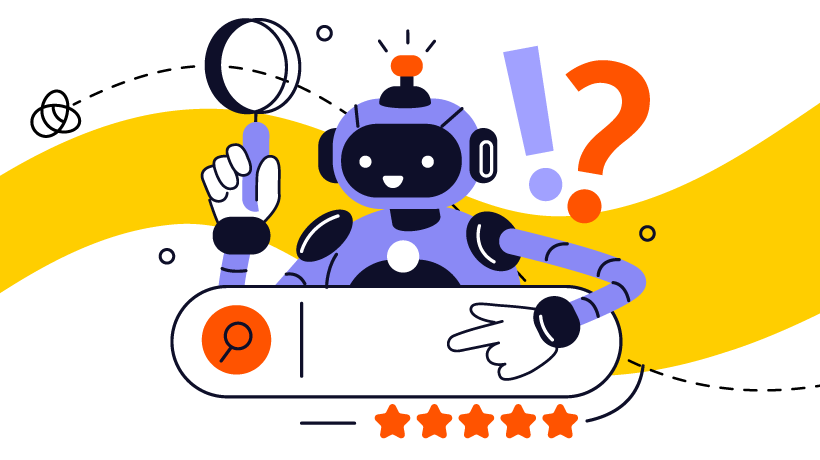If you own a website or you work for an online business, you might have noticed the gradual shift in the field of SEO.
Over the years, we have noticed that every few years, Google releases new updates that help in improving the search engine experience. In some cases, these updates address common issues faced by users, but in other cases, the goal is simply to speed up the search.
In the last few months, most websites on Google have seen a steady decline in their traffic.
Why?
The answer is simple. AI is taking over. Now with AI services like Gemini and ChatGPT, you can get a straightforward answer for each query within seconds.
To address this issue, Google started offering zero-click search. With the help of this search system, users no longer have to open a blog. Instead, the answer is served on top as an overview.
This leaves a very important question: Is AI going to take over SEO, or will it just change SEO?
Let’s look at all the important questions together.
What is AI for SEO?
Within the digital marketing world, AI has changed everything. Just a few years ago, when AI was first introduced, most people thought it would work just like a chatbot. However, with its quick wit, intelligent processing, and strong learning as well as problem-solving, it became a part of every industry possible.
The best thing about AI was that there was no price tag attached. As long as you have a fast internet connection like Xfinity and a modern laptop or smartphone, you can use ChatGPT and Gemini.
In the world of SEO, AI was used for combining some of the groundbreaking concepts like boosting visibility, ranking on SERP, and using machine learning along with data analysis.
Overall, AI changed SEO practices by helping marketers process a large chunk of data at a very good speed with decent accuracy. This data-driven approach is now helping SEO analysts create better strategies, make decisions that are more effective, and align their work based on the search engine algorithm.
Now, with the help of AI, SEO experts don’t just search for better keywords, but also optimize content and create links without allocating a lot of time. Moreover, users can now benefit from real-time analytics and performance metrics so they can make better and more accurate decisions.
How Is AI Reshaping SEO?
November 2022 is known to be a historic month in the world of tech. It was when OpenAI released ChatGPT, and eventually, search engines and content changed for good. Since AI was designed to offer instant answers even for complex questions, users eventually stopped visiting other websites.
Eventually, when Google recognized this shift, it tried adapting by offering AI overviews. These overviews soon evolved to zero-click search, offering well-structured data from the best pages.
Now that AI-generated content and its summary were appearing on top, people felt more encouraged to search for things online.
However, even with more volume of searches, the traffic on most websites took a hit. Since the audience was directly getting their answers from Google, they no longer needed to go to the site.
This is where SEO experts had to get ready for the new reality of SEO.
As an SEO expert, my curiosity lies in two very important questions. I want to know what triggers the Google summary or AI overview so I can rank my content better. Moreover, I also want to know if the length of the query or content is still impacting the Google ranking.
Let’s explore both these questions.
What Triggers a Google AI Overview?
If you are an SEO expert handling a website, this is one of the questions that you will be most interested in.
Frankly, there is no concrete answer to this question. The AI overview is just triggered by informational intent. Since AI is information in nature, it doesn’t support commercial and transactional keywords.
In fact, 99.2% of all the queries on the AI overview are completely informational.
In short, if you have questions that are more information-based, like “how can I earn more money” or “what are the features of this app”, you are more likely to land on an AI summary. If you want to boost your chances of getting included in AI overviews, then it is much better to create high-quality content that directly answers the query rather than questions that leave details or drag the answer.
A good way to write comprehensive, high-quality content is simply by adding related questions. These questions need to have essential keywords and must be arranged in a way that each question seems relevant.
Is There a Word Limit Preference in Query or Content?
Most SEO experts believe that a good blog that will rank faster and higher will cover more topics. So, if you cover more topics, essentially, your work count will be higher. Eventually, Google will see the word count as an indicator of good content.
Now, all these things make sense, but there is one big issue.
Lengthy content that does not explain a query in simpler words will not rank. Moreover, the way the query is phrased and the length of the phrase play an important role in ranking content. If the query is longer and complex, a no-click answer will appear. Similarly, if the query has nearly 7-8 words, you will get an AI-based answer.
Google actually wants the reader to avoid all the hassle of going through multiple lengthy blogs. Instead, the idea is to answer the question, offer a summary, and provide enough evidence that the user doesn’t have to go anywhere else.
Let’s take a look at an example. Search for “3-day easy meal plan for a group”.
Traditionally, this question would be answered with the help of pre-written blogs. You would have to go through each blog, read everything, and then filter out answers that you like.
However, with AI, you will get a direct answer. This answer will consist of a quick summary.
Here is an image:

After that, there will be a read more section that will further elaborate on the answer. Each day will have a separate answer with a few food suggestions.
Here is an image of that as well:
Apart from this, there will be a section with additional tips to offer some extra value.
This feature is quite powerful as it offers a structured meal plan and helps with meal suggestions, along with recipes and images. Everything mentioned is written in an interactive tone with proper references. In case you don’t like the answer, you can search the same query again, and the answer will be different, but relevant.
Will SEO Survive In The Era of AI?
As digital marketers, this question keeps most of us awake at night.
There is no doubt that the advancement of AI has made most of us think that this might be the end of SEO. However, experts believe that even if AI dominates every side of digital marketing, it will still never fully overcome the use of SEO.
Similarly, the essence of SEO will never die. There is no doubt that the current practices used within SEO will soon become outdated. However, the idea of SEO will still be there even after many years. As the technology improves, experts will learn to utilize AI for SEO as well. Most of the work that is done manually by tools will be fully automated, i.e., keyword research, content optimization, etc.
Simply put, AI has changed SEO for good. Soon, the current practices will be obsolete and replaced by new practices.
Frequently Asked Questions
Will AI replace SEO?
Although SEO will change, it will never be fully replaced. However, tasks such as content optimization and keyword research may be automated through the use of AI.
How has SEO transformed in 2025?
In 2025, SEO has become dependent on AI. Most of the informational keywords have lost their value, while transactional and commercial keywords are still going strong.

